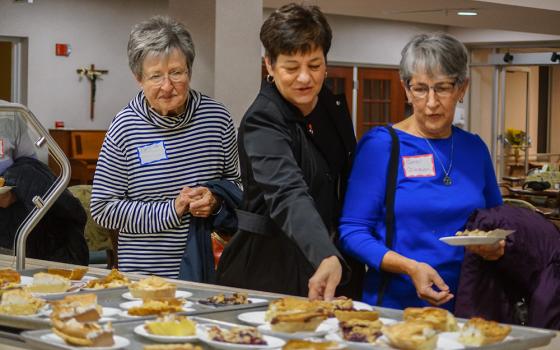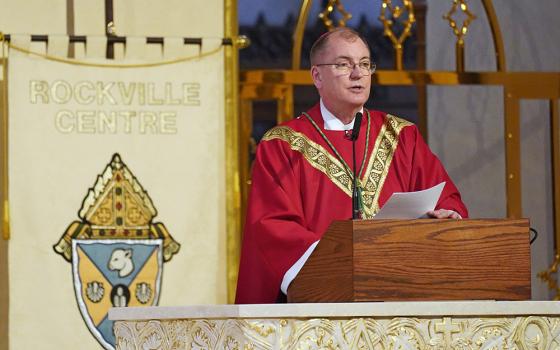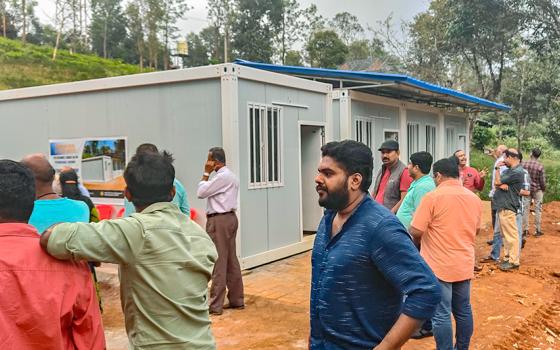Calling Pope Francis "Vatican II high octane," longtime church historian Jesuit Fr. John O'Malley said last week he sees real potential for church reform, even if it's just from the new tone and message coming out of Rome.
"With Francis, there is no mincing of words. You know where he stands, and you can't give it a spin," O'Malley, an expert on the church's ecumenical councils, told NCR Oct. 17 before speaking at an event sponsored by Rockhurst University and four other Catholic colleges.
By living out the themes of reconciliation present at the Second Vatican Council, Francis may be intentionally moving the church toward a new era of reform, O'Malley said.
"He takes seriously the mission of the church, a new mission that is really old and the most fundamental mission of the church: to be love among all, patient and full of mercy and goodness," he said during his speech at Visitation Parish here.
What might be most significant about Francis, O'Malley said, is that he did not participate in Vatican II. That frees him to bring a broad vision of that council to today's church.
"Francis is the first pope in 50 years not to have participated in the council," O'Malley told NCR. "And that's good news because he's not fighting the battles of the council that previous popes had because they were present for the council. He's beyond that, and he's above that."
Because Francis has not had to deal with the issues Popes Paul VI, John Paul I, John Paul II and Benedict XVI faced after the council, Francis has more freedom to set an example of mission for the post-Vatican II church, O'Malley said. Some of those examples include Francis' decision to announce himself as bishop of Rome, wash the feet of a Muslim woman, and bring together eight cardinals to begin working on structural reform within the church.
Even in choosing the name Francis, the pope set his own priorities, O'Malley said.
"St. Francis loved the poor, he was concerned about nature, and he was a person of peace," O'Malley said, reflecting on the pope's explanation of the name two days after his election. "I think he set the big priorities of his pontificate, and that is his big vision."
O'Malley said he thinks Pope Francis has a broad idea of what reform needs to be at this point, including an effort to reach out to all Catholics and people of other faiths and to address the structural problems of the church.
In response to the question many Catholics are asking of whether a new council will be called, O'Malley chuckled and quoted a fellow Jesuit, Fr. James Martin: "We've had Vatican III on March 13, 2013" -- the day Francis was elected to replace Pope Benedict.
On a more serious note, O'Malley said it would be extremely difficult to bring together a new council.
"Today to have a council, there are about 7,000 Catholic bishops in the world, and there were about 2,800 at the time of Vatican II. Where would you have it, Yankee Stadium?" If there were to be a new council, O'Malley said he hoped the church might look at a location such as South America or Africa.
Charity Sr. Diane Steele, president of the University of Saint Mary and co-sponsor of the Oct. 17 event, said she appreciated the opportunity to have O'Malley talk about Pope Francis. She reiterated the excitement of Francis' humble nature in leadership.
"As an educator, I think what I find most exciting about Pope Francis is he is accessible to our students," she said after listening to O'Malley's talk. "To have a pope that reaches out and talks in ways they can understand will do more for restoring the image of the Catholic church in the eyes of young people than anything else."
Fr. Thomas Curran*, president of Rockhurst University, agreed that Francis brings an important and intentional message of inclusiveness to the church today.
"It is exciting, this message that is capturing the mind of people around the world, both Catholic and non-Catholic," he said. "Everyone is talking about Francis."
*An earlier version of this story listed Curran's order incorrectly.
[Colleen Dunne is a Bertelsen intern at NCR. Her email address is cdunne@ncronline.org.]




